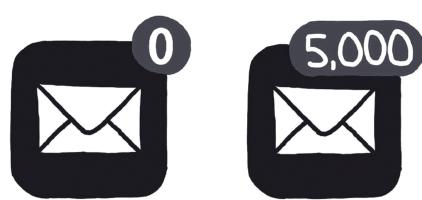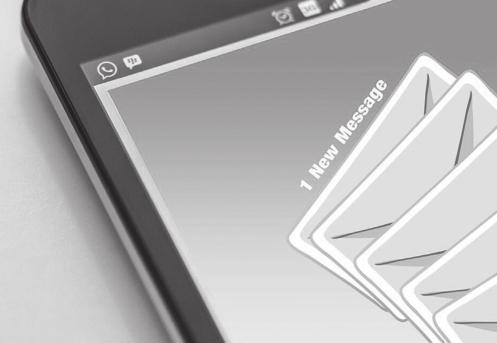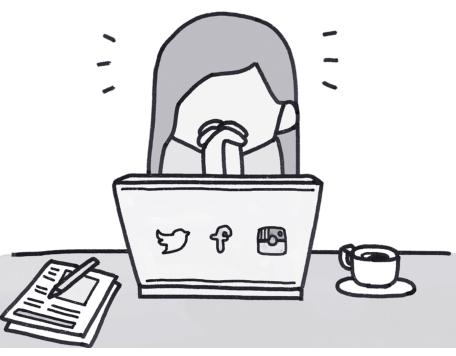你的收件箱,是0未读,还是5,000未读?
2018-10-25ByJoePinsker
By Joe Pinsker

For some, its a spider. For others, its an unexpected run-in with an ex. But for me, discomfort is a dot with a number in it: 1,328 unread-message notifications? I just cant fathom1 how anyone lives like that.
How is it that some people remain calm as unread messages trickle into their inboxes and then roost there unattended, while others cant sit still knowing that there are bolded-black emails and red-dotted Slack messages?2 I may operate toward the extreme end of compulsive notification-eliminators, but surveys suggest Im not alone: One 2012 study found that 70 percent of work emails were attended to within six seconds of their arrival.
This has led me to a theory that there are two types of emailers in the world: Those who can comfortably ignore unread notifications, and those who feel the need to take action immediately.
So what puts people in one camp or the other? Gloria Mark, a professor of informatics at University of California,has explored just this sort of question. A few years ago, she ran a study in which office workers were cut off from using email for one workweek and were equipped with heart-rate monitors; on average, going cold turkey3 significantly reduced their stress levels. (One intriguing recommendation that came out of the study was for companies to experiment with setting up systems in which less-urgent emails were exchanged in batches4: in the morning, around lunchtime, and in the evening.)

After interviewing several people about their relationship with email, Mark has noticed that, for some people, email is an extension of autonomy5—its about having control. One subject, she said, told her, “I let the sound of the bell and the popups6 rule my life.” Compulsively checking email or compulsively clearing out queues of unread emails, then, can be a form of regaining some of that control. Mark said, “So I might refine your theory to say that those who feel compelled to check email may be more susceptible to feeling a loss of control [and] in missing out on information.”
When someone drops everything just to get an unread count back to zero, productivity might be taking a hit7. “It takes people on average about 25 minutes to reorient back to a task when they get interrupted,” she says. Yes, that includes even brief interruptions, like dashing off8 a quick response to an email, and it often takes so long to get back on task because the project you start doing after handling an email often isnt the same as the one you were already doing. (These interruptions are so integral to modern workflow, Mark says, that when people lack external interruptions, such as a co-worker striking up9 a conversation, they voluntarily interrupt themselves—sometimes by checking email.)
I happen to like Marks theory, but I also think theres another urge that fuels the nagging feeling that comes with unread messages: Immediately reading and archiving incoming emails is just like checking a box on a to-do list and clearing out unread stories in an RSS feed.10 In other words, the appeal of these behaviors lies in the illusion of progress that they foster. Few tasks have a sense of conclusion as neat and immediate as archiving or deleting an email. For that reason, neurotically tidy people like me cant help but triage emails the moment they arrive.11
There are, of course, other lenses through which to view these opposing email sensibilities. Jamie Madigan, a psychologist who writes about video games, thinks the arrival of a notification might be similar to the accrual of virtual loot.12 Email, in other words, might not be just a task, but a game.“Designers of apps for the Web, phones, and other devices figured this out early on,” he says. “In the case of our phones,we see, hear, or feel a notification alert show up, we open the app, and we are rewarded with something we like: a message from a friend, a like, or whatever.” He guesses that people who dont mind notification pileups dont perceive as much of a reward from getting retweets or likes.

Ian Bogost, a professor of interactive computing at the Georgia Institute of Technology (and an Atlantic contributing editor), offers a similar theory. “What if actually there are people who care about technology as a part of their identity, and people who dont?” He stressed that his potential explanation was untested, but I do think his point about selfidentity might account for a portion of the difference.
Still, the chasm13 between these groups seems too wide to be just about technology. The icky feeling I get when I catch a glimpse of someones inbox junkyard of unread emails is the same one I get when I see the pile of magazines I have yet to read, or when I know theres an errand that needs running—the itch isnt constrained to technology.14 My email theory is really just a corollary of another, more expansive pop philosophy: Muppet Theory, proposed by Dahlia Lithwick, a writer at Slate.15 Under Lithwicks classification, everyone is either a Chaos Muppet (“out-of-control, emotional, volatile”) or an Order Muppet (“neurotic, highly-regimented, averse to surprises”).16 Lithwicks theory plays nicely with Gloria Marks, and I tend to think that—hold on, an email just came in and if you give me one sec, I just need to respond to it.
有的人最害怕蜘蛛,有的人最害怕撞见前任。而我最害怕的是一个小点和上面的数字:1,328条未读信息?我简直不能理解怎么会有人能够忍受。
当未读信息溜进收件箱时,为什么有人就能安如泰山,将之晾在那里不管,有人却一看到有黑色加粗的邮件和点了红点的工作消息就坐不住呢?我属于那种强迫症似的通知终结者,调查显示我这样的人还不少:2012年的一项研究发现,70%的工作邮件都在收到后六秒内就被处理了。
我由此得出一个结论:这个世界上收邮件的有两类人,一类可以完全无视未读消息,一类则非要赶紧点开不可。
那么,是什么因素决定了你在哪一阵营呢?加利福尼亚大学信息学教授格洛丽亚·马克对这个问题进行了研究。几年前,她做了一个实验,让一群坐办公室的人连续五天都不用邮件,然后测他们的心率。平均来看,这种突然切断邮件的做法可以显著降低他们的焦虑程度。(由此带来的一个有趣的建议是,公司可以尝试建立一种机制,把不太紧急的邮件分散在早上、午间和晚上发送。)
在问了几个人他们和电子邮件的关系之后,马克注意到,有些人把电子邮件看作是自主权的延伸,也就是说一定要由自己来掌控。她说,一名受访者告诉她:“我让消息提示音和弹出窗口来主宰我的生活。”那么,强迫症似的查看邮件或者点开一溜未读邮件就成了重获控制权的一种方法。马克说:“我或许可以这么说,那些非查看邮件不可的人,在漏看信息时更容易感到失去控制。”
如果一个人抛下手头的所有事,只为了让未读邮件清零,工作效率肯定会受到影响。马克说,“在受到打扰后,人们平均要花25分钟才能回到之前的工作中去。”对,即便是短暂的打断也不例外,比如,哪怕只是迅速回复一封邮件,回复完之后也很难回到之前的工作,因为你通常会换到另一项工作上去。(马克说,这种打断已经成为现代工作节奏的一部分了,就算没有外部的干扰——比如同事突然发起聊天,人们也会自己停下手头的工作——比如查看一下邮件。)
我挺喜欢马克的理论,不过我想未读邮件让人不爽可能还有其他的原因:即刻阅读邮件并把它归档,就像是给待办事项打钩或者是清空订阅的推送信息一样。换句话说,这种行为之所以诱人,是因为它给人一种一切都在进展之中的假象。很少有工作能像归档、删除一封邮件这样,给人一种干净利落的结束感。因此,像我这样有洁癖的人简直忍不住在邮件到来的那一刻就把它们都处理掉。
当然,也可以从其他的角度来看这两种截然相反的邮件处理习惯。出版过电子游戏方面著作的心理学家杰米·马迪根认为,邮件通知的到来有点类似虚拟战利品的积累。也就是说,邮件不仅仅是一项工作,也可能是一场游戏。“不管是网上的,手机上的,还是其他设备上的应用设计商,早就想到了这一点,”他说,“在我们的手机上,我们看见、听见,或者感觉到一个通知出现了,打开那个应用,然后就会获得一些我们喜欢的奖励:比如朋友的一条信息、一个赞、或者这之类的。”他猜测不介意通知越堆越多的人,可能是因为不把被转发或者被点赞当作什么了不起的事。
伊恩·博格斯特是佐治亚理工学院的交互计算教授,也是《大西洋月刊》的特约编辑,他提出了一个相似的观点。“会不会有的人把科技当作他们身份的一部分,而有的人则不然呢?”他强调说他的这个想法未经过验证,但是我的确认为他关于身份的观点可以在一定程度上解释这种差异的存在。
当然,这两类人之间的差别之大,不是区区技术就能解释的。我看到别人有一堆未读邮件时,那种如鲠在喉的感觉就仿佛我还有一大摞的杂志没有读,或者我还有一桩跑腿的活还没有干——那种心里痒痒的感觉可不仅仅是技术层面的。我的邮件理论是直接从一个适用性更广的流行理论中得出来的,即戴利亚·里思维科,Slate杂志的一个作家,提出的木偶理论。里思维科把所有人都分为两类,一类是混乱木偶——“不受控制,情绪化,喜怒无常”,一类是秩序木偶——“神经质,死守规矩,讨厌惊喜”。里思维科的理论跟格洛丽亚·马克的说法正好吻合,我觉得吧——等等,我收到了一封邮件,给我一小会儿,我先回复了再说。
1. fathom: 弄清,理解。
2. trickle: 滴,缓慢而零星地进入;roost: 栖息;Slack: 国外的一款办公软件。
3. cold turkey: 突然戒断。
4. batch: 一组,一批。
5. autonomy: 自治,自主。
6. popup: 弹出窗口。
7. take a hit: 受到打击,受到影响。
8. dash off: 一气写成,快速写完。
9. strike up: 开始(交谈)。
10. nagging: 令人心烦不已的,纠缠不休的;archive: 把……归档,存档;RSS feed: 订阅信息,RSS即Really Simple Syndication,指简易信息聚合。
11. neurotically: 神经质地,神经过敏地;triage: 情况鉴别分类(以确定哪些问题最为严重须优先处理)。
12. accrual: 积累,增加;loot: 战利品。
13. chasm: 深刻分歧,显著差别。
14. icky: 令人不快的;junkyard: 废品场;errand:差事。
15. corollary: 必然结果,直接的结果;muppet: 提线木偶;Slate: 1996年创办于美国的网络杂志,擅长政治评论、离奇新闻和艺术特写。
16. volatile: 不稳定的,易怒的;regimented: 嚴格控制的,死板的。
